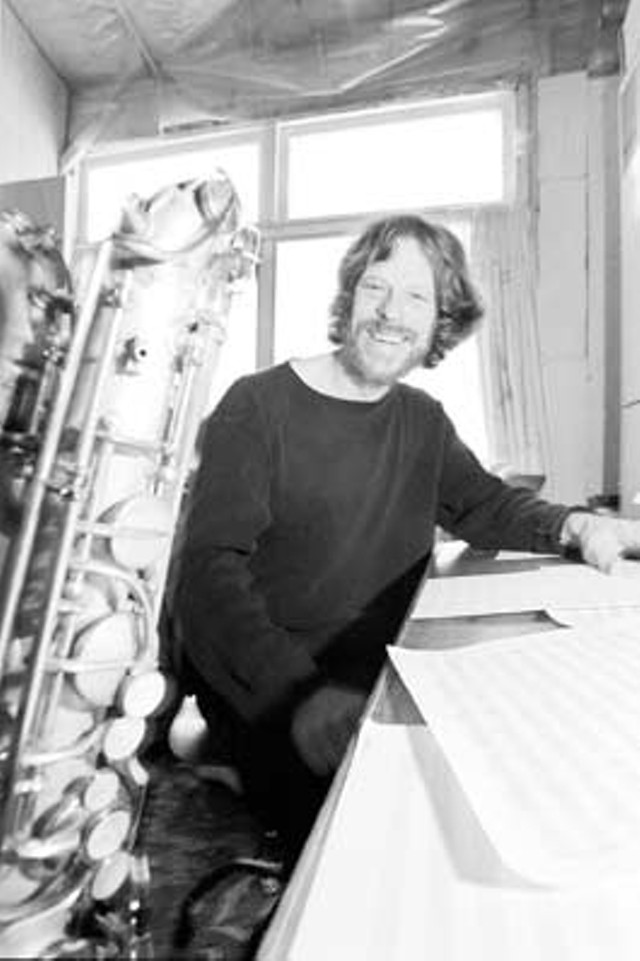Published April 18, 2001 at 8:29 p.m.
It was a snowy ride out to Lincoln when I went to check in with Michael Chorney, one of Vermont’s most creative and committed musicians, at a turning point in his career. Six years ago, the saxophonist organized a gaggle of central and northern Vermont musicians into viper House — a high-octane, cosmo-funk mini-orchestra interpreting the music of Charles Mingus, Sun Ra and Duke Ellington, as well as Chorney’s own compositions. ViperHouse had a fresh, contemporary groove-jazz flavor.
In the ensuing years, the nine-piece earned an enthusiastic following in Burlington and beyond, playing hundreds of live concerts up and down the Atlantic Coast and as far west as Colorado. They shared stages with such friends as Phish guitarist Trey Anastasio and the lamentably late clown prince of free jazz, Lester Bowie. The honorary viper, who had been an artist in residence in Vermont before his untimely death from cancer in November 1999, said of the band, “There’s a spirit of joy and fun in their music that’s highly contagious. I believe I have been infected.”
When rumors of the band’s dissolution began circulating in January this year, I was surprised and disappointed. Following the departure of a few members the previous summer, the remaining sextet seemed to be the tightest and most potent lineup yet. And at a time when more and more college-aged listeners are opening up to such creative music, the sky should have been the limit for the accessibly groovy, acid-jazz “spasm” band, as the vipers called themselves. There’s something to be said for going out on a high note, but without a final show or any sort of formal announcement, closing the door on viperHouse felt like a good friend had moved out of town without saying goodbye.
A recent opportunity to check out Chorney’s free-improv quartet at the Compost Art Center in Hardwick, however, reminded me that while bands come and go, musicians themselves remain to brighten another day. The audience at Compost was small for The Ephemorons, but the music was large, and quite a departure from anything I’d heard the vipers play. The music was far less groove-oriented, with the quartet developing a more abstract, impressionistic sense of rhythm and melody. It seemed strongly influenced by Chicago’s Association for the Advancement of Creative Musicians Collective, and their progeny.
By the time I arrived at the goose-coop-turned-charming-mountain-hideaway where Chorney, now 45, makes his home with his wife and two young daughters, I’d realized that for him this is not an ending but the beginning of the next stage in a rich musical life. Settling in for a chat in his cozy studio amidst a collection of records, instruments and piles of manuscript paper, the bearded and overalled Chorney projected palpable excitement about the music he’s been composing and arranging since viperHouse’s final gig in December.
Seven Days: ViperHouse disbanded so quietly that many people reading this probably aren’t aware that the group is no longer active. What was behind the decision to call it quits when things seemed to be going so well?
Michael Chorney: Well, at the end of last year, we’d just completed a season of touring — hard touring, lots of long drives. We were at a place where we’d been working with the new lineup, the sextet, for about six months, and the next step would have been to record the material we’d been working out on the road for a new album. In fact I’d been making the preliminary arrangements to do that — with whom and where, getting it lined up. But the implications of doing another recording would have meant everyone re-committing to the project for at least nine months to a year, because if you’re going to put out a record, you have to tour and promote it.
We were going ahead with that in mind, but towards the end of last year a confluence of factors really called into question how viable that commitment could be, and whether or not it could be met and adhered to in the right way. Some of it was just attrition; you know, over the course of the last two years, 250 shows, that’s a lot. So there was the fatigue factor, and some of it was my own personal fatigue. There really is a lot of energy expended attempting to be an effective band leader…
We’d made this big transition last spring and had done our final concert with Heloise [Williams], Brian [Boyes], Dan [Mallach] and P.J. [Davidian], and had pretty successfully transitioned into the new lineup. The music was wonderful; there was some really compelling stuff. But… a number of personal factors, really major life changes, occurred over the course of like two or three weeks… It seemed like the best thing to do was to say, well, we’re done.
I was primarily responsible for wanting to do it quietly. I felt that after the big hoopla in June… to try and revisit any experience even slightly akin to that didn’t feel right. We didn’t make an announcement at all. We didn’t do a final show, so to speak, just sort of quietly went home.
SD: Did you consider putting the band on a more temporary hiatus?
MC: We were thinking about taking a big chunk of the winter off, but some of the things that were going on with folks called into question whether they were going to be able to do the band at all… I could have put together viperHouse 3, or 4 or 5, but five of the six of us had been working together for five and a half years, and although viperHouse had started off as my vision, what happens over the course of time, with any group, is that it becomes more of a collaboration. A band to me is defined by when the chemistry between the players is as prominent a feature of what happens on stage as the compositions or the execution of them. That’s a great strength, but it can also be a weakness: It works both ways. We had certainly evolved into being much more of a collective, and I didn’t feel like it was my choice to say, “All right, here’s another viperHouse.”
SD: What’s been most satisfying about your experience with the group?
MC: Well, there are specific things. Working with Lester was certainly a wonderful thing, and there are certain concerts I remember, and the recording sessions, putting out four great albums… as far as the band’s history, there’s a lot to be proud of. But overall, what was really most enriching and fulfilling was the process itself, and this ongoing thread in our creative lives that fed me, fed all of us. Coming towards the end, that was in the balance and, in any kind of endeavor, if things are unhealthy to any degree, and you have some capacity to change it, that’s the thing to do. Defining what’s healthy and unhealthy for yourself, well, that’s what living’s about.
SD: Nicely put. Let’s talk about what you’ve been up to over the winter. You went out on a short tour in January with a small combo supporting an improvised dance project.
MC: I’ve been working at Middlebury College for many years, collaborating with Penny Campbell, one of the dance professors there. She’s a proponent of a method of improvising which is really very interesting and deep work. It’s really very rigorous, just the opposite of “make it up as you go along.”
SD: A popular misconception about improvisation.
MC: Yes, it is. Penny has engendered a lot of these methodologies and points of view in me, regarding improvising. So this winter, she was directing the dance company at Middlebury. They have this thing called “J-term” which is kind of a “basket weaving” month for the students there, so to speak, except for these dancers. They’d worked really hard for the entire fall, and in January we did a small tour of schools around the Northeast, and a few performance spaces. The musical component was myself, Rob Morse from viperHouse on bass, Jared Baird, who’s a Middlebury graduate, on drums, and Darren Case on alto sax, who’s going to graduate this spring.
Both Jared and Darren had taken an improvisation class I taught last year. There were some great musicians in it, but these two were really outstanding, and from what I understand, that class really changed their outlook on music in a big way; we worked together very well. So we went off in January and did a lot of music, all of it improvised. Seven dancers, four musicians. We did some great work, and we did some not-so-great work; that’s the nature of it. It reminded me, with viperHouse having just concluded, about the nature of process and being able to embrace process on its own terms.
Then the four of us went on to perform up in Hardwick a few times, and we’ve got a show coming up at the Bristol Bakery in April. I’m not sure how long or how often we’ll perform from here on out, as some of the guys are moving away, but it’s something I hope we continue to do. For myself, it only satisfies a certain aspect of what I like to do musically. I really value improvisation, but to do it exclusively I would find unfulfilling, because I love composing. That’s… what I’ve been doing here all winter.
What I’ve found since the band ended — and I was really unaware this was even going on — was that my creative energies were being spent so largely on each night’s show, and focusing all sorts of other kinds of energy on just keeping the thing going. Since then, I’ve just been in this room. . . I’ve just been working on all this stuff. I’ve done more compositional and creative work in the last three months than I had in the entire last year. And it’s great to do it without deadlines. I’ve been writing original music for an ensemble that doesn’t even exist yet; I don’t even know what the instrumentation will be like. Talk about doing something for the sake of process!
SD: I know you’ve also been working independently on some arrangements.
MC: Right, my other big project right now is arranging all this music by Kurt Weill and Nino Rota, with a few other pieces thrown in… I’m maybe halfway through the Kurt Weill charts, the Nino Rota is pretty much done. Of all things, I’m including some Bob Marley pieces, though not for the sake of irony — I have no interest in irony at all.
It’s been a great way to focus my energies, and it’s nice to have these different outlets. If I’m in a fairly inspired melodic mode, I might work on my solo piece or my original compositions. If I’m in more of a “nuts and bolts” mode, I might work on writing out these charts and working on the arrangements. I’m definitely “interpreting” the music, and it’s wonderful stuff, the Weill and Rota. What’s so great about it is that both of these composers, their tonal language is in certain ways similar and very complementary, but one’s Germanic and the other’s Italian, so you get a nice yin-yang there. What they both did was to use rhythmic elements as icons, in an iconographic way. They may use certain beats, maybe an “oompah” beat or a kind of blowsy jazz feel, things like that, so the listener has a way into the music, like these little doorways. But they don’t do it to be arch, or clever. I hate things that are “clever.”
I think two or three tunes from The Threepenny Opera we’ll be playing almost verbatim, in some of the others I’m using short phrases as launching pads for improvisation. I’ve spoken with all of the musicians at this point; it’ll be an eight-piece ensemble. The instrumentation should be pretty amazing. If it all works out it’ll be bass, tuba, drums, electric guitar, accordion, viola, trombone, tenor sax, flute, alto and baritone saxes. These are all people doubling on different instruments.
I’ll have all the charts prepared in advance, and the musicians will have them ahead of time, so it shouldn’t take too many rehearsals, because I have a pretty clear idea about how it’s gonna go. Over the course of a month, probably during the summer, I’ll try to organize five, maybe six concerts. We’ll record during that time, possibly in the studio, possibly live, and that’s it. At the end of the run, it’s done, and onto the next thing... I’d like to do The Rite of Spring at some point!
These musicians are excited about doing it, but they’re glad they’re not joining a band. It’s just doing a project. There are folks who’ll be involved in this who were in viperHouse, people that I hope to work with in various incarnations for the rest of my days. It’s good to feel at ease enough inside myself that I’m not compelled to rush these things through or get ’em out right away.
I’m really enjoying not playing smoky bars and driving around endlessly. There were certain aspects of that lifestyle that were wonderful, and other aspects that were absolutely brutal. For right now, this winter, it’s been great to be right here at home, working and feeling really satisfied, fulfilled and self-reliant.
SD: Well, it looks to me like you and your wife have a situation out here in Lincoln that would be the envy of a lot of musicians and artists.
MC: It’s taken an incredible amount of fortitude and sacrifice in order to cultivate a lifestyle where our work is of such importance and we’re able to keep doing it… That’s why I’ve learned to become such a good car mechanic!
I realized at one point that it’s not a choice. For me, it’s a calling of some sort, not to get too lofty about it. And there were certainly some moments after viperHouse folded that my confidence was called into question. But that simply went away as soon as I started working on the music again.
More By This Author
Speaking of Music, musician Profile
-

Two Local Band Directors March in the Macy's Parade
Nov 22, 2023 -

Before a Burlington Show, the Wood Brothers Get Back to Basics
Oct 26, 2023 -

After a Half-Century of Leading Local Ensembles, Steven and Kathy Light Prepare a Musical Farewell
May 3, 2023 -

Double E 2023 Summer Concert Series Kicks Off With the Wailers
Mar 17, 2023 -

UVM’s New School of the Arts Gathers Many Creative Disciplines Under One Roof
Sep 14, 2022 - More »
Comments
Comments are closed.
From 2014-2020, Seven Days allowed readers to comment on all stories posted on our website. While we've appreciated the suggestions and insights, right now Seven Days is prioritizing our core mission — producing high-quality, responsible local journalism — over moderating online debates between readers.
To criticize, correct or praise our reporting, please send us a letter to the editor or send us a tip. We’ll check it out and report the results.
Online comments may return when we have better tech tools for managing them. Thanks for reading.













































